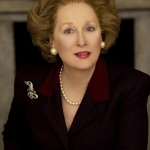 Playing Margaret Thatcher must be great for an actress like Meryl Streep. Thesps just love it when they get the chance to play vile people from history. Murderers, rapists, sex offenders and the like give an actor the opportunity to feel brave and bold.
Playing Margaret Thatcher must be great for an actress like Meryl Streep. Thesps just love it when they get the chance to play vile people from history. Murderers, rapists, sex offenders and the like give an actor the opportunity to feel brave and bold.
And ol' Streepy knew too well that pretty much everyone on Earth hates Thatcher. This is something that made her "more interested" in portraying the heartless witch in 'The Iron Lady'.
And Meryl has some theories on why everyone despised her so much and… well… she's off the mark really.
The Oscar-winning actress (we're legally obliged to say that or people from Hollywood come and crack our shin-bones with slender golf clubs) was shocked at the level of hatred for the former British prime minister, which is a clear highlighting of just how little interest she had in the world during the '80s and '90s.
Streep said:
"We give our elected leaders iconic stature almost to have things to tear down, to work out all sorts of our own psychological problems and needs and venomous feelings. So I wondered about all the times that Margaret Thatcher was spoken about being unfeeling.
"And I thought, 'Well, why was that? Was she really completely unfeeling?' And as a public figure in a much smaller way myself, I understand that feeling of being stripped of your humanity. Was she a monster?
"While we were making the film, people had such strong and particular and specific venom for her. It was sort of stunning. It made me all the more interested in where her humanity lay."
So, researching the part, you'll assume that Meryl worked out why Thatcher was so reviled by many Brits, right? WRONG. See, Streep believes the anger directed towards Maggie Thatcher was largely down to the fact she was a woman.
"I did suspect that there was a weird special rage about her because she was a woman. From all sides. The policies that she pursued were the same policies that Geoffrey Howe pursued, although he's not loathed and detested with the same intensity. And I think that it is a discomfort with, and a confusion about, women in leadership roles.
"For feminists it's a betrayal because she doesn't do the right thing, and so you hate her more than you'd hate a man who stood for the same things."
It may have had something to do with the countless riots that took place under her stewardship, as well as the fact that industrial production fell massively during her government, which is seen as an affront to the working classes. In short, there were nearly 3.3million unemployed in Britain in '84, compared to 1.5million when she came to power in '79.
In 1990, when she resigned, over a quarter (28%) of children in Great Britain were considered to be below the poverty line. Thanks to the procedures she put in place, that number kept rising after her time in Downing Street, leading to Britain's having the highest childhood-poverty rate in Europe.
And she talked funny.
No hay comentarios:
Publicar un comentario